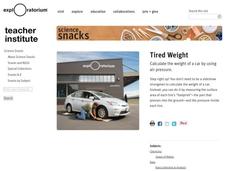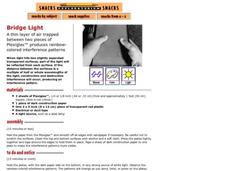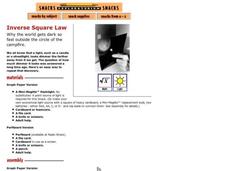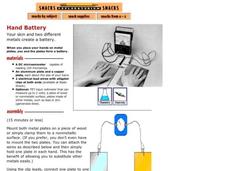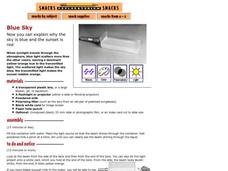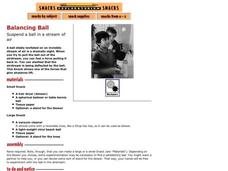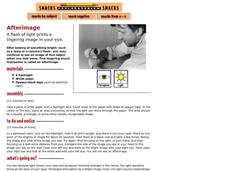Exploratorium
The Three Little Pig(ments)
Photocopy single-color images onto acetate transparencies and either demonstrate or have your class experience the combination of colors to produce images. Children will learn that cyan, magenta, yellow, and black combine to make all of...
Exploratorium
Tired Weight
Take your class out to visit your automobile and use the tires to compute the weight of the vehicle. This is done by measuring the surface of the tire meeting the ground and the air pressure. This is a fun lesson in the relationship...
Exploratorium
Resonant Rings
Physical or earth scientists construct this clever contraption to demonstrate how size effects frequency. Several paper rings of various sizes are taped onto a board and shaken to create vibrations. The resonant frequencies are easily...
Exploratorium
Radioactive Decay Model
Toss 100 pennies (or poker chips or any other two-different-sided objects) and remove all of those displaying tails. Line them up and repeat. The lines of pennies collected get smaller each time, successfully representing half-life.
Exploratorium
Pinhole Magnifier
Using a pinhole in an index card, learners of light find that it can be used as a magnifier.
Exploratorium
Moire Patterns
By overlapping combs and window screening and by looking at a printed set of consecutively larger circles, learners observe Moire patterns, which provide a visual of what happens during wave interference.
Exploratorium
Disappearing Act
Crafty critters are camouflaged to escape predators, and crafty science pupils can construct a camouflage demonstration. They work with a partner to show that as a camouflaged animal moves, it becomes more visible.
Exploratorium
Bridge Light
An illuminating activity demonstrates how interference of light waves creates a pattern. Using Plexiglas™ and construction paper, participants see rainbows appear as they twist or press against the plastic plates. After the activity, you...
Exploratorium
Pupil
Give pupils a magnifier, a mirror, and a flashlight so that they can examine their own pupils. As they shine a light on their eyes, the light is shone on how this structure dilates and contracts to control how much is allowed into the...
Exploratorium
Polarized Sunglasses
Reflected waves of light move within a plane, and because of this, polarizing materials can reduce the glare our eyes see. This resource explains how to set up a demonstration of this effect. Consider it for use in your physical science...
Exploratorium
Laser Jello
The concepts of refraction and reflection gel with your physical science class during this colorful exploration. Shining lasers through Petri-dish-shaped gelatin desserts, they will notice how the light travels and bounces off the sides....
Exploratorium
Inverse Square Law
The inverse square law is revealed when your class participates in this activity. They move a graph paper or perfboard square back and forth in a square of light to see how the intensity changes. You will definitely want to add this...
Exploratorium
Hand Battery
Get hands-on in your physical science class by having learners conduct electricity with their own hands! By placing one hand on each of two different metals, a current can be generated and measured on a microammeter. Make an experiement...
Exploratorium
Jacques Cousteau in Seashells
Visionaries create images out of dots to demonstrate the eye-brain connection. Through this activity, they learn that the brain interprets data collected by the eye into recognizable information. Search online for "Jacques Cousteau in...
Exploratorium
Descartes' Diver
Pique interest in water pressure, demonstrate buoyancy, and explore water displacement concepts with a homemade Cartesian diver. You may want to change the name of the toy, however, as is is not documented the Rene Descartes actually...
Exploratorium
Diffraction
Kindle knowledge of how light travels by using this activity in your physical science curriculum. By setting up a candle flame or flashlight bulb and viewing it through a slit, observers of light see evidence of its wave characteristic....
Exploratorium
Blue Sky
Use a container full of water as a prism and show that as light is bent, the individual colors from different wavelengths become visible. This explains why the sky appears to be blue midday, and why as the sun nears the horizon, it looks...
Exploratorium
Blind Spot
A small card with a dot and an X is held at arm's length and used to show youngsters where their blind spot is. This illuminating little activity is a compact addition to your lesson on the structure of the eye as it explains the part of...
Exploratorium
Balancing Ball
Demonstrate lift to the class that is studying aerodynamics. In the stream of air produced by a blow dryer, little physicists place a wad of tissue paper and a spherical figure to compare. Or, if you have a vacuum cleaner and beach ball,...
Exploratorium
Balancing Stick
Have some physical science fun when studying the center of gravity or center of mass. Simply have balancing artists stand a dowel on one finger and keep it from falling over! A lump of clay is added and moved up along the dowel over a...
Exploratorium
Afterimage
To illuminate how afterimage occurs, create a star, square, or other geometric-shaped light for learners to look at for 30 seconds. Then, have them explain what they see as they shift their focus to a blank wall. A full explanation of...
Exploratorium
Soda Can Mirrors
Here is an entertaining and illuminating lesson on morphed images. Middle schoolers make cylindrical mirrors by wrapping soda cans in reflective mylar. First, they try to determine what the images are that are embedded in the plan by...
Exploratorium
Building Three-Dimensional Structures
Are you looking for a good 3-D geometry lesson that includes hands-on activities for your middle schoolers? Look no further than this one! Pupils use centimeter grid paper embedded in the plan, along with detailed construction...
Exploratorium
A Splash of Color - Is Pure Water Colorless?
What makes the ocean blue but a glass of ocean water nearly colorless? Investigators prepare tubes of water to examine the color of water. Scholars discover the relationship between light absorption, color variations, and water depth as...



